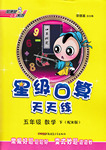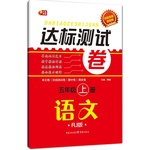题目内容
| |||||||||||||||||||||||||||||||||||||||||||||||||||||||||||||||||||||||||||||||||||||||||||||||||||||||||||||||||||||||||||||||||||||||||||||||
解析:
(1) |
选B。without意为“没有”。 |
(2) |
选A。此处应填一个名词,excitement是名词。 |
(3) |
选C。此句是被动语态,动词应为过去分词。 |
(4) |
选D。carry意为“携带”。 |
(5) |
选A。own意为“自己的”。 |
(6) |
选C。因为mother是单数。 |
(7) |
选D。先行词是the place,关系词应为where。 |
(8) |
选B。should意为“应该”。 |
(9) |
选A。依题意。 |
(10) |
选C。problem意为“问题”,指需要解决的问题。 |

 星级口算天天练系列答案
星级口算天天练系列答案 芒果教辅达标测试卷系列答案
芒果教辅达标测试卷系列答案完形填空
Plants are very important 1 things. Life could not go 2 if there were no plants. This is because plants can make food from air, water and sunlight. But animals and man cannot 3 so. Animals get their food by eating plants and 4 animals. Man gets its food by eating plants and animals too. 5 animals and man 6 plants in order to 7 . This is why we find that there are so many plants around us.
If you look 8 at the plants around you, you will find that there are many types of plants. Some plants are large, 9 others are small. 10 plants are green. There are two sorts(种类)of plants: flowering plants and non-flowering(不开花的)plants.
Flowering plants have roots(根),stems(茎),leaves, flowers and fruits(果子). 11 all the trees around us are flowering plants. Flowering plants 12 make seeds(种子). The sends 13 by the fruits. Some fruits have one seed, some have two, three or four, and some have many seeds. But a few fruits have no seeds 14 . 15 example of a fruit 16 seeds is banana fruit.
Most non-flowering plants do not grow from seeds. They grow from spores(孢子). Spores are small. Some spores are 17 small and 18 that they can float(漂浮) 19 the air. We may say that spores are quite different from seeds. When these spores 20 on wet and shady(阴凉的)places, they usually grow into plants.
1. A.live |
B.lively |
C.living |
D.lived |
[ ] |
2. A.through |
B.over |
C.down |
D.on |
[ ] |
3. A.hope |
B.do |
C.think |
D.make |
[ ] |
4. A.another |
B.the other |
C.other |
D.others |
[ ] |
5. A.Though |
B.And |
C.But |
D.So |
[ ] |
6. A.need |
B.want |
C.find |
D.have |
[ ] |
7. A.grow |
B.live |
C.work |
D.eat |
[ ] |
8. A.careful |
B.clear |
C.carefully |
D.clearly |
[ ] |
9. A.while |
B.when |
C.since |
D.as |
[ ] |
10. A.A great deal of |
B.Lot of |
C.More |
D.Most |
[ ] |
11. A.Between |
B.Except |
C.Almost |
D.Hardly |
[ ] |
12. A.should |
B.can |
C.may |
D.must |
[ ] |
13. A.are born |
B.are hidden |
C.are stored |
D.are kept |
[ ] |
14. A.any longer |
B.any more |
C.at last |
D.at all |
[ ] |
15. A.The |
B.An |
C.A |
D.For |
[ ] |
16. A.without |
B.with |
C.full of |
D.of |
[ ] |
17. A.too |
B.very |
C.so |
D.much |
[ ] |
18. A light |
B.active |
C.little |
D.strong |
[ ] |
19. A.on |
B.in |
C.by |
D.above |
[ ] |
20. A.put |
B.move |
C.place |
D.fall |
[ ] |
完形填空
Emily
and Peter have lived next door to each other as long as they can remember. When
they were ___(1)___ children, they ___(2)___ play together. They were good
friends, though they sometimes fought over toys. ___(3)___ they grew older, they
seldom(很少) played with each other. Emily preferred to be with girls and
Peter preferred to play with boys. When they were about fifteen years old, they
almost stopped ___(4)___ to each other, not because they disagreed with each
other, ___(5)___ because they belonged to different groups. Emily began to study
French and also enjoyed watching football games. Peter was only interested in
sports.
___(6)___
was football that brought Emily and Peter back together. One day, after Peter
went home, he looked into the window of Emily’s living room and saw ___(7)___
she was watching a football game on TV. He walked up and knocked at the door.
Emily was ___(8)___ to see him, but asked him to come in and they watched the
___(9)___ of the game together. They are good friends again. They ___(10)___
have different ideas about things
sometimes, but they agree with each other that football is the world’s best
game.
(1)
[ ]
|
A.a
little |
B.little |
|
C.a
few |
D.few |
(2)
[ ]
|
A.often |
B.used
to |
|
C.were used to |
D.themselves |
(3)
[ ]
|
A.When |
B.While |
|
C.So |
D.Because |
(4)
[ ]
|
A.speak |
B.spoke |
|
C.to speak |
D.speaking |
(5) [ ]
|
A.and |
B.but |
|
C.that |
D.so |
(6) [ ]
|
A.It |
B.This |
|
C.That |
D.What |
(7)
[ ]
|
A.what |
B. |
|
C.why |
D.if |
(8)
[ ]
|
A.surprise |
B.surprising |
|
C.surprised |
D.a surprise |
(9)
[ ]
|
A.other |
B.next |
|
C.later |
D.rest |
(10)
[ ]
|
A.yet |
B.also |
|
C.still |
D.too |
完形填空
Jane is 1 English schoolgirl. She is thirteen. She lives 2 London (伦敦). She 3 at the No.1 Middle School. Jane gets 4 at half 5 five every day. She6 Russian and English in the morning. She 7 breakfast(早餐)at half past six. After that, she goes to school 8 her friends.They have four 9 in the morning 10 three in the afternoon. In the evening, she does 11 homework at school. She often 12 TV 13 Saturday evening. Jane likes 14 She draws 15 than her brother. She likes reading story-books, 16. Now she 17 an English story-book in 18 room.
(1) A. a |
B. an |
C. the |
D. one |
[ ] |
(2) A. in |
B.on |
C. at |
D. with |
[ ] |
(3) A. study |
B. studys |
C. studies |
D. studying |
[ ] |
(4) A. on |
B. in |
C. down |
D. up |
[ ] |
(5) A. at |
B. past |
C. from |
D.about |
[ ] |
(6) A. reads |
B. does |
C. writes |
D. listens |
[ ] |
(7) A. have |
B. has |
C. makes |
D. begins |
[ ] |
(8) A. for |
B. to |
C. on |
D. with |
[ ] |
(9) A. class |
B. classeses |
C. classes |
D. clases |
[ ] |
(10)A. or |
B. but |
C. than |
D. and |
[ ] |
(11)A . his |
B. her |
C. one's |
D. she's |
[ ] |
(12)watches |
B. sees |
C. looks |
D. looks at |
[ ] |
(13)A. in |
B. at |
C. on |
D. for |
[ ] |
(14)A. draw |
B. to drawing |
C. draws |
D. drawing |
[ ] |
(15)A. good |
B. well |
C. better |
D. best |
[ ] |
(16)A. too |
B. also |
C. then |
D. right |
[ ] |
(17)A. read |
B. reading |
C. is reading |
D.reads |
[ ] |
(18)A. his |
B. her |
C. hers |
D. its |
[ ] |